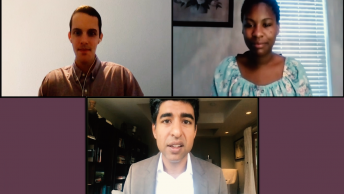By Lauren Spigel
The weeks and months following birth are among the most difficult, most dangerous, and paradoxically, the least supported time periods for new and growing families.
Christine thought giving birth would be the hardest part of bringing her son into the world. Birth classes and prenatal care visits did not prepare her for the reality of what she would face in the weeks following delivery.
Her son, born nearly eight weeks premature, had to spend his first ten days in the neonatal intensive care unit (NICU). The small, family-run company in New York City that employed her was too small to provide Family and Medical Leave Act (FMLA) benefits to employees, which guarantees twelve weeks of unpaid leave for the birth of a child. Instead, she was offered six-weeks of unpaid leave.
In the midst of recovering from the physical trauma of birth and emotional distress of having a premature son in the hospital, Christine had to make an impossible choice.
“I gave birth on a Wednesday and I went back to work on Monday,” she said. “It was either take my six weeks of unpaid leave while he was in the NICU or go back to work and take it when he got home.”
Christine is not alone. The United States is the only developed country that does not offer any paid maternity, parental, or home leave to mothers, according to the Organization for Economic Cooperation and Development. In fact, only 15% of American workers had access to paid family leave in 2017, according to Department of Labor (DOL) data. The DOL also found disparities in family leave among hispanic and non-hispanic black workers as well as low wage earners.
While some states such as California, New Jersey, Rhode Island, and, more recently, New York and Massachusetts have state-mandated paid leave plans, the lack of a national mandate leaves many families to make the impossible choice of earning a paycheck or taking care of their newborn.
We have so many expectations of parents in the first weeks, months, and years of their children’s lives, and yet our society offers appallingly little support to new and growing families.
As a 30-something, many of my friends and colleagues have started their families in the last few years. I informally asked my networks to share their personal experiences with maternity, paternity and family leave.
It’s important to note that those who responded to my request and are included here are not a representative sample of the United States. Most hold at least a bachelor’s degree, have a partner, are cisgendered, straight, and white, which we know are factors that are associated with having more parental leave than other groups, according to DOL data. Despite the overwhelming privilege, this group struggled to obtain leave, to support their families financially, and suffered consequences at work.
Though everyone’s stories varied in details, the message was clear: there is not enough support to allow parents to grow their families with dignity.
Kate N, Registered Nurse, Washington, DC: “I got sixteen weeks. Only six weeks were paid…I felt super lucky with what I got, honestly. I did have to fight for the sixteen weeks. It’s tricky business. I had to look up [company] policy and print it off and fight for it because they were trying to push back on what I asked for, even though legally I could have it. When bringing it up, one manager told me, ‘it’s just a baby; it’s not supposed to be a vacation. You are lucky to get twelve weeks.’”
Anonymous, Consultant, New York City (via his wife): “[His] company doesn’t do paid family leave. They cover the full salary for two months for men and three or four months for women, but it doesn’t stop your work clock…This was bad for [his] situation. They compare everyone together whether you worked full time or took leave. [He] had a bad review [after taking two months paternity leave]. His project [when he got] back was insane. He was pressured to take this project that kept him at work until 2-3:00 a.m. every day to make sure he was staffed as soon as he was back from paternity leave. And then in order to get another project in before the review period was over, he took another [one] of these intense projects.”
Ashley P, Health Educator, Upstate New York: “As a supervisor of a program I feared losing my job if I took more than two months off. My daughter at two months would not take a bottle and the poor thing would wait all day to eat until I got home from work…Even though Paid Family Leave allows a mother half her pay for up to twelve weeks, this does not apply for New York State (NYS) employees. Not only that, NYS employees do not qualify for NYS disability, so we are forced to use all our vacation and sick time accruals for any childbirth…. Neither of my children were ready for me to return to work…The price paid out to moms has not increased in over thirty years….not enough to sustain oneself or family.”
Sarah A, Finance, New York City: “Sixteen weeks sounds like a long time but it was way too short. I still felt like I was leaving a newborn with a stranger when I had to go back to work. We were still trying to get schedules sorted out and were just starting to get into the rhythm of parenting when I had to go back to work. My firm was very inflexible when I returned to work. [I] couldn’t work from home for any portion of time, people stared at me when I ran out at 6:00 PM so that I could see the girls for thirty minutes before they went to bed. I switched jobs after my second daughter was born and now I work in a much more family friendly environment.”
Megan G, Teacher, Northern Virginia: “When the eight weeks [of short-term disability] ended and I was still out of work, but covered under the Family Medical Leave Act, I stopped receiving a paycheck, but still had to pay my insurance premiums. I didn’t receive a full paycheck until I was back at work for approximately two months. This was extremely frustrating and challenging…It was not enough time and not enough pay. It was very difficult because I received no extra leave even though I gave birth to twins. I had to be induced early because of a medical condition so my twins were born prematurely (by four weeks and one day), and I had to pay double the amount for my copays and NICU charges, yet I still was not provided anything extra by my insurance or employer.”
As a country, we need to take better care of our new and growing families. The lack of mandated leave means that new parents are piecing together parental leave from their short-term disability, sick and annual leave. This utter lack of policy leads to disparities based on job and income. It places an undue burden on new parents, who are forced to navigate complicated policies, negotiate with their employers for time off, and transition back to work before they or their babies are ready. Some face consequences once they return to work and others choose to stay home to save money on childcare. None of this creates an environment in which new families can thrive.
Christine’s son, long-past his days in the NICU, is now five years old. But Christine’s experience of having so little maternity leave still feels like a raw deal.
“You can’t survive or raise a family or even recuperate from your own experience with six weeks without pay,” she said.
The American public agrees. There is broad public and bipartisan support for paid family leave policies: 82% of Americans believe that mothers should receive paid leave following the birth or adoption of a child and 69% believe that fathers should as well, according to Pew Research Center data.
In line with public opinion, most of the 2020 democratic candidates support Senator Gillibrand’s FAMILY act, which would provide gender-neutral paid family leave for up to twelve weeks.
But we need to go further – twelve weeks is not enough. We need a new vision for family leave that mandates at least six months of gender-neutral paid leave, giving both parents time to bond with their newborn at their most vulnerable time without suffering consequences at work.
The reality is that having a baby is not the same as having a disability, nor is it the same as taking a vacation. Our country needs a family leave policy that reflects that.

Lauren Spigel is a Research Specialist on the Science and Technology Platform at Ariadne Labs, where she advises her colleagues on research methods. She primarily partners with the BetterBirth and Delivery Decisions teams to understand and reduce disparities in maternal and child health care. Overall, Lauren has spent ten years working on programs across the reproductive, maternal, newborn and child health spectrum, spanning Africa, Southeast Asia and the Americas. Lauren holds an MPH from Johns Hopkins Bloomberg School of Public Health.



